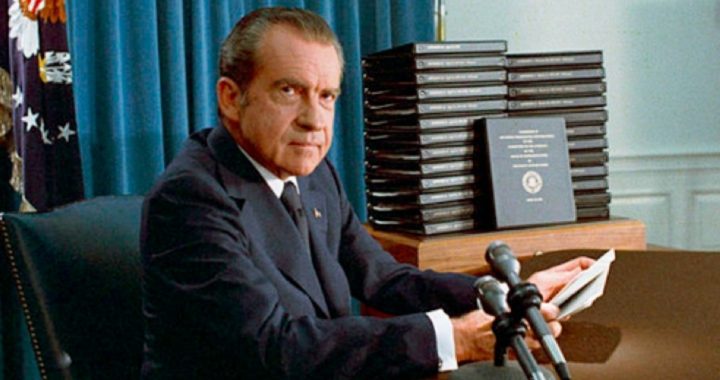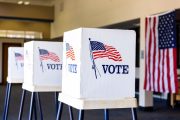
U.S. Department of Justice (DOJ) officials have filed a brief in federal district court in opposition to a historian’s bid to unseal records pertaining to the Watergate political scandal in the 1970s, which led to the resignation of President Richard Nixon. While the DOJ agrees that some of the Watergate papers should be released, it remains steadfastly opposed to making public the documents related to wiretap information, claiming that it is safeguarding the privacy rights of innocent people.
The Watergate scandal dates back to an incident on June 17, 1972, when five men affiliated with the Nixon reelection campaign and the CIA were caught breaking into the offices of the Democratic National Committee in the Watergate office complex in Washington, D.C. and arrested. The arrests led to a major cover-up in an attempt to prevent the burglars from being tied to President Nixon.
However, secret tape recordings and other evidence helped prosecutors build the case and expose the cover-up. Nixon resigned, and was later given a full pardon by his predecessor Gerald Ford. According to Wikipedia, “The scandal also resulted in the indictment, trial, conviction and incarceration of 43 people, including dozens of top Nixon administration officials.”
Nearly 40 years later, in 2009, history professor Luke Nichter of Texas A&M University asked U.S. District Court Chief Judge Royce Lamberth to release the sealed records from the original trial of the five burglars and their two advisors, G. Gordon Liddy and E. Howard Hunt.
Despite the widespread publicity of the trial, so much remains undisclosed, particularly relating to the contents of the wiretap. Fox News explains:
The man whom the burglars had hired in the spring of 1972 to monitor the wiretap installed at the DNC offices — a former FBI agent named Alfred C. Baldwin III — has never been permitted to state explicitly what he overheard.
A gag order put in place by the D.C. appellate court during the Liddy trial, and still in effect today, has prohibited Baldwin from disclosing the contents of the Watergate wiretap, because the conversations of DNC secretaries and other personnel were illegally intercepted.
Officials at the DOJ agreed that it was time for some documents to be released.
“Forty years after the break-in at the Democratic National Committee that began the chapter of U.S. history known as Watergate, no good reason exists to keep sealed many of the judicial records created during the trial of the Watergate burglars,” U.S. Justice Department attorney Elizabeth Shapiro wrote in a court document.
Judge Lamberth agreed that some of the sealed documents from the case could now be opened to scholars, including “bench conferences about evidentiary matters that could not be discussed in the presence of the jury” and “records of pre-trial meetings between lawyers and the court in chambers that concern[ed] the investigation or other trial matters.”
The DOJ has identified three categories of items which it believes should remain secret: personal information, grand jury information, and information obtained through wiretaps.
The last category is most notable in this case. In his request, Nichter asked to have access to the secret testimony given by Baldwin and other documents pertinent to the wiretap. Baldwin’s testimony gave prosecutors enough evidence to indict Hunt and Liddy, as well as a number of others. Most analysts believe it would reveal the ultimate purpose for the Watergate break-in.
But the government lawyers observed,
As the Supreme Court has emphasized, safeguarding the privacy of innocent persons who have not consented to the interception of their communications was a motivating factor behind the passage of the 1968 law that prohibits illegal wiretapping. In this case, the majority of the victims to the illegal wiretap at issue have expressed their continued objection to any disclosure of the wiretap contents.
DOJ attorney Shapiro said in court papers (PDF) filed late Friday that federal wiretap laws do not allow “discretionary disclosures based on historical or scholarly interest.” Federal law, she added, “makes such knowing disclosure a crime, and we are unaware of any court that has unsealed previously undisclosed illegal wiretap content for reasons of historical interest.”
Nichter, who runs a government website that catalogues the secret recordings made by President Nixon, plans to press the court to release the trial documents, despite the opposition from the Department of Justice. Judge Lamberth is expected to rule on the issue within the next few months.
But the DOJ said on Friday that “the department continues to disagree that courts possess inherent authority to reach outside” federal rules that dictate grand jury secrecy.
“Whether or not historical interest, as a policy matter, should be considered as a justification to release grand jury information where the need for secrecy demonstrably has waned, presents a question for legislators and policymakers, not for courts,” Shapiro said.
Observers have noted the irony in the DOJ’s opposition to the release of some of the Watergate documents: The DOJ proposed changes last year to the Federal Rules of Criminal Procedure that would have permitted some grand jury records to be unsealed after 30 years. An advisory conference to the Judicial Conference rejected the idea.
Despite the DOJ’s insistence on keeping some documents sealed, Nichter remains optimistic about the information that will be released. “I’m obviously going to get something, but I don’t know what that something is,” he said Saturday.
The Justice Department was also opposed to the release of Nixon’s testimony in front of the grand jury in June 1975, though Attorney General Eric Holder did not file an appeal when the court ruled in favor of release. Judge Lamberth ruled in that case that the historians’ arguments for releasing the nearly 300-page transcript outweighed the arguments in favor of secrecy, since the investigations are long completed and President Nixon died nearly 20 years ago.
Photo: Richard Nixon with transcripts of White House tapes




